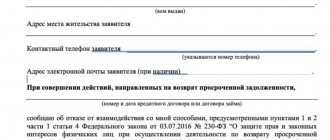How to calculate the statute of limitations on borrowed funds
To understand exactly when the claim period for a loan taken out expires, you need to be able to correctly calculate 3 years. What date should I aim for? There may be several options:
- The date on which the loan agreement expires.
- The date on which the debtor made the last payment on the debt.
The borrower prefers the first option. But the second one is more suitable for the lender. Judges, when considering claims, follow the second option. This means that there is a greater chance that the statute of limitations on the loan will start from the date the debtor last paid the debt or interest on the debt.
The first option is not used if a legal dispute regarding credit cards is being considered, when the established overdraft limit appears indefinitely.
What options for resolving controversial situations are still found in judicial practice? The period is calculated from the date when the bank learned about the fact that a citizen had formed a debt and was able to initiate collection of the amount. For example, this may be the date of the first lack of payment of borrowed funds and interest. In general, a lot depends on the judges, legal advisers working for the lending institution and the borrower's experienced lawyer.
If a debt has formed, before collection services take on the task of collecting debts, it is better to try to negotiate with the bank to repay the money in installments, in installments. When a credit institution negotiates with collectors and sells them a debt, they demand to return the funds as soon as possible and will bother not only you, but also your relatives, not disdaining to use unscrupulous measures.
Sometimes the statute of limitations period at the end of the contract is increased. This happens when two parties to a transaction have made a compromise decision.
To be on the safe side and avoid contacting a collection agency, many credit institutions include in the agreement a period of 5, 10 and even 20 years for the validity of the loan. If such a clause is present in the document, it is no longer possible to challenge it after signing. Therefore, you should be careful about the documents you sign.
Can debt collectors file a lawsuit after the statute of limitations has expired?
The right to file a claim for collection of accounts payable arises from the moment of the first delay in fulfilling the obligation, unless otherwise provided by the contract. From the next day the borrower is late in depositing funds to repay the next loan payment, the calculation of the statute of limitations begins.
The creditor-debtor relationship can continue as usual. Negotiations may take place between them, new agreements may be concluded, the debtor may fully or partially satisfy the bank’s demand for repayment of the loan debt, the bank may partially or completely write off the debt or provide a “credit holiday.”
All of the listed possibilities for out-of-court settlement of a conflict situation suspend, but do not cancel, the running of the statute of limitations. Its course stops completely in the following cases:
- full repayment of debt and interest (fines, penalties);
- debt forgiveness (written document).
Do debt collectors have the right to sue after the statute of limitations has expired?
They have the right, but it is unlikely that they will win in court. When the statute of limitations on the loan ends, the collection agency can sue, and at the same time call and bother you with letters demanding that you still pay off your debts.
When a judge considers such claims, he does not pay attention to whether the statute of limitations has expired or not. He has no time to do this. Therefore, if the period has expired, the borrower must convey this fact to the judge. His task is to submit a petition to the court. The latter is quite enough for the judge to issue a refusal to satisfy the creditor’s claim.
Can debt collectors sue after the statute of limitations has expired?
Yes they can. Based on the assignment agreement, collectors act as a full-fledged creditor, the very right to demand repayment of the debt
in court they have. It seems pointless, because the court must refuse. But the calculation is made on the legal illiteracy of the defendant.
All the debtor needs to do when filing a collection agency with the court is to inform the judge about the application of Art. 199 of the Civil Code of the Russian Federation or send a written petition to the court - a statement about the expiration of the limitation period. After this, the collectors will be denied the claim.
But usually collectors prefer moral pressure. The debtor expects numerous calls with demands, exhortations, and proposals. Perhaps they will try to put pressure on your conscience and ask you to sign a letter acknowledging the debt, or at least part of it.
Important!
Signing such a letter is a direct path to renewing the statute of limitations on his debt.
There is one more nuance: if the amount of debt is less than 500,000 rubles, then collectors can simply go to court to issue a court order. This is a simplified debt collection procedure that does not require a court hearing or the presence of the parties.
And the order issued by the court is at the same time an executive document with which debt collectors can apply to bailiffs for forced collection of debt.
In this case, the debtor needs to do the following:
- Go to the bailiffs and get a copy of the writ of execution from them.
- Apply to the court that issued the court order with a request to cancel it and consider the case in the ordinary course of judicial proceedings.
- At the court hearing, declare that the statute of limitations has expired.
(17.8 KB)
Application to cancel a court order (20.2 KB)
It is very important to do all this before the bailiffs seize at least part of your funds to pay off the debt. If you suspect that debt collectors may sue you, it is better to periodically check your legal debts through the official FSSP service.
What to do if collectors demand debt on an outdated loan
If the collectors do not calm down and demand payment of the old debt, it is necessary to determine that the debt was not collected while it was still valid. To do this, perform the following manipulations:
If legal proceedings are found, or perhaps there is a decision to collect the debt on the loan, you will have to submit and return the money. It is important to take into account the following features:
- Check whether the debt has been sold to collectors or not. If yes, then ask the collectors to give you a photocopy of the agreement on the assignment of claims.
- If enforcement proceedings have begun, you must contact the bailiffs.
When paying off a debt, do not forget about the safety of checks. This is the only way to prove payment of the full amount in the event of claims from collectors or bailiffs.
Is it worth paying back an old debt?
By law, you don't owe anyone anything. But the collectors who bought the debt from the bank will not retreat back. Their actions may not always be legal:
- Collectors first exhort and then threaten.
- They call the debtor and his relatives in the middle of the night.
- They send letters about the worker’s unpaid debt to the management of the enterprise. No boss will like this.
In addition, your credit history will remain forever damaged. It is unlikely that any bank will dare to entrust its money to an irresponsible client. Summarizing all these troubles that debt collectors bring, sometimes it is more profitable to say goodbye to them by paying the debt.
Is it possible not to repay an old loan?
Every citizen has the right to decide for himself whether to repay an old debt or not. On the one hand, the law allows you not to voluntarily repay a debt for which the credit limit has expired. But the moral side of the issue should not be omitted. Each option for resolving the situation has positive and negative sides.
Please note! When repaying an overdue loan:
- Collectors will no longer have influence on the debtor. Their methods are very unpleasant and can cause a lot of negative emotions and stress for the debtor himself and his relatives;
- You will be able to receive a loan repayment statement from the bank. This document confirms the fulfillment of obligations and increases the chances of obtaining loans in the future;
- the bank will transmit information to the Credit History Bureau that the loan has been repaid. In this case, the credit history will still be damaged, since the debt was paid much later than the due date;
- The debt must be paid in full or not at all. Partial payment renews the statute of limitations, and the balance can be enforced through court.
If a debt with an expired ID cannot be returned:
- the statute of limitations will not be renewed, since no actions will be taken to confirm the existence of debt obligations;
- The bank will write off the debt as bad. The positive thing is that the citizen does not owe anything. But the tax service will charge 13% income tax on the written-off amount;
- the bank can transfer the debt to collectors, for whom it does not matter whether the LID has expired or not. They can act by illegal methods, humiliate honor and dignity, and harass family and friends. Often such moral pressure turns out to be much more effective than the threat of litigation;
- the credit history will be damaged, the record of the outstanding debt will not allow other banks to issue a loan in the future.
Watch the video. What is the statute of limitations:
Where to complain about debt collectors
If collectors do not leave you or your relatives alone for a long time, despite the expiration of the loan statute of limitations, contact higher authorities. The debtor should first write a statement to the collection agency or bank with a request to stop communicating on the topic of the old debt.
If specialists do not pay attention to this, it is time to contact the bailiffs. They can hold workers accountable under Article 14.57 of the Code of Administrative Offenses of the Russian Federation. This responsibility is administrative in nature.
It happens that unofficially employed citizens act as collectors. Then you can also file a letter of complaint against them. Each collection agency is supervised by the National Association of Collection Agencies. You need to file a complaint on their website. They will review your application and respond within a week.
If a representative of the association is convinced that specialists have violated the rights of the debtor, disciplinary measures may be taken against the latter:
- Employees are obliged to eliminate the violation and stop harassing the borrower.
- Collectors must submit a report on measures that will prevent violations of the borrower’s rights from recurring.
- If an agency commits repeated violations, as indicated by multiple complaints, the agency may be expelled from the association.
ATTENTION! Our portal has a free legal section, where our experts answer pressing questions from our readers. All you need to do is fill out the form below and wait for a response from our specialist within 5 minutes. For your convenience, consultations are held at any time of the day (24/7). Ask a question:
What to do if collectors call and the statute of limitations on the loan has expired?
The widespread distribution of credit products among the population has led to an increase in the number of citizens who do not repay funds to the bank. Modern financial institutions have a wide arsenal of tools that can be used to collect debt incurred by a borrower: from security services to the possibility of going to court.
However, initiating legal proceedings is not always beneficial for the bank. Therefore, such institutions often sell borrowers' debts to collection agencies. The latter's employees do not always act within the existing legal framework. This fully applies to the time frame during which collectors have the right to collect debts. In this article, we will look at what can be done if the statute of limitations allotted by domestic law for a previously received loan has expired, and debt collectors continue to call.
Dear readers! Our articles talk about typical ways to resolve legal issues, but each case is unique.
When the period is extended
The law provides for cases of suspension of the limitation period for credit debts from collectors. All of them are set out in Part 1 of Art. 202 of the Civil Code of the Russian Federation. The statute of limitations may be extended by the period during which the debtor, who stopped making payments to repay the loan, negotiated with the bank about installment payments or debt restructuring. Conducting such negotiations is suspended until the end of the limitation period, but for no more than 6 months.
This you need to know: What to do in the event of a threat from collectors
LEDs and collectors
As a rule, the client’s debt is transferred to collectors if the bank sees no other ways to return the funds . Quite often, such action is carried out after the statute of limitations has expired. At the same time, the collection agency expects to collect the debt, focusing on the legal illiteracy of the majority of debtors. Often this approach bears fruit, since citizens who do not know their rights and are aware of the methods of debt collectors pay off the debt.
A natural question arises: if the bank sold the debt to collectors, what is the statute of limitations? To answer this, it is necessary to pay attention to the very concept of LED, regulated by the Civil Code. This term refers to the time period during which a person (both an individual and a legal entity) has the opportunity to protect his rights in court. This concept also applies to loan agreements.
Peculiarities. In the case of loans, the limitation period cannot exceed three years.
In accordance with current laws, SID begins to be deducted from the moment the creditor’s rights are violated. In the lending industry, such a moment is the first late payment. As soon as a citizen fails to make a payment, the three years given to the bank to initiate legal proceedings can begin to count down.

Let's figure out whether there is a statute of limitations on loans from collectors. In this case, it is necessary to focus not on which company is collecting the debt, but on the debt itself.
In accordance with the law, the transfer of debt from one organization to another does not entail the reset of the SID . Accordingly, collectors can actually focus on the statute of limitations on the loan and take actions to collect it before the expiration of this period. However, they cannot start counting the TIA from scratch after acquiring the right to collect the debt from the debtor.
How is the term calculated?
This period begins from the moment the first delay occurs, when the rights of the creditor are violated. This period should be important not only for banks, but also for collection agencies; they should also know how many years they can demand from the debtor to repay the loan debt.
ATTENTION! According to the legislation in the field of lending, the statute of limitations is 3 years.
It does not increase or decrease even if the debt is transferred from the bank to a collection agency. When employees of a credit institution have handed over the debt to collectors, the first thing you need to do is find out when the first delay occurred and whether it is worthwhile to collect the debt at this point.
But it is not uncommon for bank employees to miss the required period for filing an application against the debtor in court, the deadline has expired, and the collection agency demands a refund and continues to pester the debtor with calls and visits. In this case, it is worth contacting a good lawyer, he will help you find protection from arbitrariness.
Banks, to preserve their reputation, rarely go to court to recognize a debt after the statute of limitations has expired. This may alert other clients and negatively affect the number of loan applications. The fact that a banking institution is violating the law will quickly become known to others and potential borrowers.
But there are more known cases where debt collectors sued, although the statute of limitations had expired. In this way, banks are trying to solve their problems with debtors with the help of another institution.
If collectors violate the law
As the current regulations indicate, a claim cannot be made against the borrower to repay the debt if the statute of limitations has expired. Such actions are illegal. However, first of all, it is necessary to make sure that the SID has actually passed, since many citizens forget about such a concept as interrupting the statute of limitations.
If within three years the borrower has established contact with a collection agency or with the bank that issued the loan, the period is canceled.
Therefore, it is recommended not to sign any papers, since this may lead to the fact that the SID will begin to be deducted from scratch (however, even in this case, the deadline for protecting rights in court is no more than 10 years).

If debt collectors demand repayment of a debt after the statute of limitations has expired, a citizen can protect his rights:
- The first step is to write a statement to the police, describing the current situation.
- If law enforcement officials do not take any action to resolve the situation, you can complain to the prosecutor's office. As a rule, contacting this regulatory body allows you to solve the problem.
It is important to remember that, despite the threats, debt collectors cannot:
- seize the borrower's property;
- enter his residential premises without obtaining permission from the owner;
- publicly and personally humiliate the debtor's dignity.
Do collectors have the right to sue after the expiration of the SID?

Nobody prohibits collectors from filing a claim against the debtor. Even if it is accepted, a positive result cannot be expected. Yes, collectors can call the debtor, write letters to him demanding voluntary repayment of the debt, but this will lead nowhere.
Can a wife's property be seized for her husband's debts?
When considering such claims, the judge does not understand whether the statute of limitations is valid or has already expired; he has no time for that. The interested party in this case is the defendant, who must report this fact to the court. For this purpose, a special petition is drawn up.
It is on the basis of the petition filed by the defendant, indicating the expiration of the SID, that the judge refuses to satisfy the plaintiff’s demands.
Can debt collectors file a lawsuit?
Collection agencies have the right to initiate legal proceedings against a debtor. Despite the fact that this method is not always profitable (the court can significantly reduce the amount of payments), it is sometimes resorted to. At the end of the trial, the judge will most likely side with the debt collectors and force the borrower to return the funds.

But can debt collectors file a lawsuit if the statute of limitations has passed? The legislator cannot take away the right of a collection agency to file a lawsuit, even if the TID has expired. Often such companies use this opportunity to conduct a process in absentia and obtain a court order.
In such situations, it is recommended to contact experienced lawyers. Firstly, the specialist will be able to clarify whether the statute of limitations has actually expired. Secondly, a lawyer will be able to competently protect the interests of a citizen, acting within the legal framework.
The borrower may file a petition indicating that the statute of limitations on the loan has expired. This is enough for the judge to refuse to satisfy the collectors' demands.
In addition, a citizen can challenge an already issued executive document. To do this, you must file a lawsuit. In some cases, the threat of disseminating information about illegal actions to the media helps.
Indeed, if the statute of limitations has expired, in most cases the bank, like collection agencies, will not be able to do anything to collect its funds.

However, it is not recommended to use LID as a way to avoid repaying a loan. This is because:
- Banks operate automatic systems. This means that the financial institution never “forgets” about its debtors.
- During the limitation period, the banking organization has the right to file a lawsuit. Moreover, the judge will most likely side with the financial organization, as a result of which the borrower will have to pay not only the loan amount and interest, but also penalties, penalties and other fines.
- Lack of loan payments negatively affects a citizen’s credit history. Such behavior will lead to all banks refusing to cooperate with the citizen. This will significantly complicate the process of obtaining a loan in the future.
Can debt collectors file a lawsuit after missing a deadline?
Appeal to the courts for collectors is not the main option for collection. Usually they seek repayment of the debt through endless calls, written demands, and personal meetings. These debt collection methods can be used even after the statute of limitations has passed.
If the debt collector's statute of limitations has expired, they can still go to court. Collection options:
- the collection company draws up documents to the magistrate for an order
- it will be issued without checking the statute of limitations if the borrower does not send his objections within 10 days; - collectors file a claim and receive a decision
- this is possible if the defaulter does not submit a statement about missing the deadline.
In both options, the court will issue a refusal if the debtor exercises his right and raises objections. Our lawyers will help you draw up all the documents for this.
Three years of not contacting collectors and banks is the wrong method to solve a debt problem
Remember that the expiration of the statute of limitations on a debt does not mean it is automatically written off. Only a bankruptcy procedure can free you from unaffordable loans and other debts.
When the statute of limitations is extended or reinstated
The law prohibits extending statutes of limitations for legal entities, even if they were missed for good reasons. But in some cases, restoration or extension is possible:
- if the borrower performs any actions that directly or indirectly confirm the debt, then the term will be interrupted and begin to flow again;
- If the period has expired, but the debtor acknowledges the debt in writing, the statute of limitations begins to run again.
Actions confirming the debt may include partial payment or signing of any documents. For example, when responding to a claim from collectors, the debtor may indicate that he fully recognizes the debt in a certain amount. This document can be presented to the court as evidence to restore the period of time for collection.
Even before concluding an agreement with a collection company, the bank can offer the borrower a credit agreement on installment plans, restructuring, or refinancing. In this document, you can also indicate a clause on the recognition of debt, or on the emergence of new obligations. To avoid deadline extensions, always carefully check the proposed documents. Our lawyers will provide assistance with the verification.
Collectors demand debt after the statute of limitations
Business, 1st floor
Mon.–Fri. from 9:00 to 18:00 Sat., Sun. day off

Loan debts lead to negative consequences for the borrower. Some clients believe that they can be avoided by waiting until the statute of limitations expires. But is it?
What is the statute of limitations?
The statute of limitations is the period during which the creditor can demand repayment of the debt under the contract and seek its recognition in court. According to Article 196 of the Civil Code of the Russian Federation, it is three years, after which the debt is canceled if a lawsuit has not been filed against the debtor. The limitation period is counted:
- from the date of termination of the loan agreement;
- from the date of the last loan payment.
Filing a claim against a borrower after the statute of limitations can be challenged by him in court. To do this, you need to file a petition to terminate the claim proceedings, but you need to take into account that in the legislation of the Russian Federation there are conditions under which the limitation period cannot be challenged:
- if force majeure circumstances arise that prevent the creditor from submitting an application to the court in a timely manner;
- when martial law is introduced in the country;
- upon suspension or repeal of the law regulating this type of legal relationship;
- when a state moratorium is introduced;
- in case of contact between the creditor and the debtor, as well as the collection company.
In the latter case, situations of interaction between the parties during the period of loan arrears are considered. For example, the client answered a call from a bank employee or made a payment on a loan - the countdown begins again. This also applies to the transfer of debt by inheritance or if the obligations fall on the client's spouse.
When considering the statute of limitations as an opportunity to avoid paying debt on a loan, the client needs to understand that it does not exempt him from fulfilling his obligations under the contract. The bank is deprived of the opportunity to confirm the debt in court, but can collect it independently or transfer the debt to collectors.
Forms of attracting collectors
The bank has the right to involve a third party to collect loan debt if contractual obligations have been violated. Collectors can be involved on the basis of:
- agency agreement - represent the interests of the bank and act on its behalf;
- assignment agreement - receive the right to claim the loan.
The procedure for the assignment of the right to claim for debt is determined by Articles No. 382, 388, 389, 390 of the Civil Code of the Russian Federation.
Can debt collectors demand repayment of a debt after the collection period?
The law determines the statute of limitations for judicial collection of debt, but even after its expiration, the creditor has the right to repay the debt out of court. Filing a claim by collectors after the expiration of the loan agreement can be canceled by the client’s statement about missing the collection deadline.
Application for missing the statute of limitations
You can send an application with a list of attachments, a letter with notification, or submit it in person to the court office. The document is prepared in three copies: one for the bank, the second for the court, and the third for the borrower.
Situations when a bank recognized a loan as bad and refused to repay it are extremely rare. Most often they are associated with force majeure circumstances, such as a natural disaster, military action, economic crisis or bankruptcy of the debtor client. If the bank cannot independently collect the debt from an unscrupulous borrower, it transfers it to collectors or goes to court. This can be avoided if you make loan payments on time or negotiate with the lender to change the loan repayment terms in case of financial difficulties.
Statute of limitations and debt collectors
If difficulties arise between credit institutions and clients related to the accumulation of debts to repay loan funds, banks try to resolve them on their own. But if all methods of influencing the debtor have been exhausted, they turn to debt collectors. This usually occurs after the statute of limitations has expired.
The methods used by debt collectors to work with debtors are designed to ensure that clients, for the most part, are legally illiterate and do not understand what is legal and what is not in the actions of debt collectors. Not wanting lengthy disputes, people are trying to repay their accumulated debts.
Let's take a closer look at the concept of the statute of limitations. This is important to know, because when a bank sells a client’s debt to a collection agency, a person must understand what the statute of limitations is in this case. In accordance with the provisions of the Civil Code, the IIA is a period of time during which the debtor, who can be either an individual or a legal entity, has a chance to protect his rights in court.
This concept also applies to loan agreements. But there are certain nuances here. For example, if we are talking about a loan agreement, the statute of limitations cannot be more than 3 years.
According to current legislation, the specified period begins to count from the moment of violation of the rights of the bank that provided the loan. If we talk about loans, then the first delay in payments is the moment when the rights of the lender were violated. Accordingly, at the same time, the countdown of the three-year period began, during which the bank has the right to file a claim in court against its client-debtor.
The next question arises: does such a period exist in collection companies? Here it is important to focus on debt, and not on the company itself.
Note! If one organization sells a client's debt to another organization, the statute of limitations does not reset.
This way, debt collectors can take into account the loan's TIR and take actions they believe are necessary to collect the debt before that period ends. Although they do not have the right to count the SID from zero, that is, from the moment of acquiring the right to collect debts from the debtor.
How is the statute of limitations calculated if the bank sold the debt to collectors?
The ease of obtaining loans becomes the reason for the growth of Russians’ debt to banks. If a financial institution is not interested in “extorting” money from a client on its own, the case is transferred to a collection company. However, in such situations, citizens have a question about what the statute of limitations is if the bank sold the debt to collectors. Let's look at the nuances of this topic.
Dear readers! Our articles talk about typical ways to resolve legal issues, but each case is unique.
If you want to find out how to solve your particular problem, please use the online consultant form on the right or call
Statute of limitations and actions of debt collectors
The bank transfers the debt to collectors only when all methods of collecting the debt on their own have been tried, and it is impossible to return the money in any other way.
This often happens when the statute of limitations has passed and a lawsuit can no longer be filed. In this case, collection agencies rely on the debtor’s legal illiteracy.
It happens that this approach works: the debtor, frightened by the aggressive methods of influence of collectors, returns the debt. The legality of such demands raises questions.
The Civil Code of the Russian Federation defines the statute of limitations as the period of time during which an individual or legal entity can file a claim in court to protect their rights.
Remember! The calculation of the statute of limitations on credit obligations begins from the moment of violation of the creditor’s rights. That is, the first late payment is the starting point of three years for filing a claim.
In the matter of debt collection, it does not matter which organization is involved in this: a bank or a collection agency. The only thing that matters is the statute of limitations of the debt.
According to the current rules of law, the transfer of a debt does not renew its statute of limitations, and it is impossible to demand repayment of the debt after the end of the IDA through the court. Accordingly, collectors, like the bank, are limited in time by 3 years after the first late payment on the loan.
Thus, after three years, banks and collection agencies will not be able to go to court and collect the debt through enforcement proceedings. But this does not prevent them from seeking repayment of the debt by other methods.
The bank is a serious organization and will not want to spoil its reputation by illegally collecting debts. For this purpose, he sells debts, including overdue ones, to collectors who rarely go to court and whenever possible.
The methods of work of collectors are rarely in the legal field, because the bank has already tried all legal ways to get money. Even with arrears on a loan, a person should not forget about his civil rights.
It is important to know that collectors do not have the right to:
- seize the debtor's property;
- unauthorized entry into the debtor's home without the permission of the owner;
- humiliate the honor and dignity of the debtor personally and in public.
To avoid such problems, it is better to settle the issue of partial debt repayment with the bank.
I will take out a loan for you for a fee
Read how to file a claim against a bank for a loan here.
How to submit a complaint to the prosecutor's office via the Internet, read the link:
Contents of terminology
Let's start by clarifying the concept of the statute of limitations. The period under consideration includes the time interval during which the creditor has the right to demand compensation for damages in court .
In simple words, from the moment the loan is issued, the borrower becomes a bank debtor. If there is a delay in payment, the structure warns the client about the need for payment.

Moreover, the day when the debtor delayed the transfer of funds becomes the starting point for the statute of limitations for collection. Although in this situation it is appropriate to take into account certain nuances. If the defaulter partially repays the arrears or recognizes the legality of the transaction, such a moment resets the expired limitation period.
Important ! The stated circumstances are explained by legal definitions. It says here that the statute of limitations is counted from the date of violation of the lender’s rights.
Accordingly, the delay in transferring the payment and the payment received later eliminate the elapsed period when the creditor has the right to defend justice in court. The second example of interrupting the elapsed time is the debtor signing a claim or reconciliation report. From this moment a new LED starts.
Duration of the period
Now let's move on to specifics and find out what time frame the legislation allocates for debt collection by a creditor. Here lawyers talk about the duration of such a period for three years . This rule applies to the accumulation of debt by both individuals and legal entities.
However, the probability of interruption and extension of this time is mentioned above. In situations where borrowers sign a restructuring agreement, the statute of limitations expires only upon full repayment of the borrowed funds or after 36 months from the date of arrears under an already signed installment payment agreement.
Attention ! Even in a situation with an extension of the specified time, the deadline for the likelihood of collecting funds here is 10 years.
Probability of change
Let us discuss the question of whether the period under consideration is transformed when the right to claim debt is transferred to collectors. In such circumstances, lawyers say that such actions are inadmissible.
In other words, the statute of limitations does not reset if the debt is purchased by another company.
However, in the circumstances described, it is appropriate to take into account the likelihood of extending the specified time. If, on the eve of signing the assignment agreement, the bank client confirmed the existence of a debt to this financial structure, the collection agency has the right to file a claim against such borrower for three years. Such actions are confirmed by primary documentation.
Violations of the law

Let's move on to consider the problem when the statute of limitations on the loan has expired, and collectors call demanding the money back.
The described technique lies outside the legal field, since it violates the civil rights of the debtor and legal regulations.
However, it is advisable for the defaulter to check whether the creditor has any reason to extend the statute of limitations. If the borrower is right, it is inappropriate to panic in such situations.
The work of collection services is regulated by the provisions of Federal Law No. 230.
It directly states the prohibition of unauthorized entry into the home of a defaulter or attempts to seize this person’s property.
In addition, it is advisable to take into account other restrictions on the actions of representatives of such organizations: a ban on night calls and meetings or the dissemination of confidential information.
Important ! An effective measure of intimidation in such situations is the threat of initiating legal proceedings.
The legislation does not exclude the possibility of filing a claim even after the statute of limitations has expired . However, the debtor retains the right to appeal this application. A petition explaining the circumstances of the case becomes the basis for the court to reject the collection company’s claim. Such an application is submitted before the verdict in the case is rendered.
If time is lost, legal regulations leave a chance to challenge the illegally issued writ of execution. This requires going to court in person and filing an appropriate claim. Moreover, in the case when a citizen is convinced that he is right and has collected papers that confirm the expiration of the statute of limitations, it is appropriate to complain about the unlawful actions of collectors to the regulatory authorities even before the trial.
When debt collectors break the law
The most common violation if the bank sold the debt to collectors is filing claims in violation of the rules for calculating the statute of limitations. This occurs due to ignorance, or deliberate misleading of an ignorant debtor, about the beginning of the limitation period. Most borrowers who are not familiar with the law believe that the statute of limitations begins to count for their debt from the moment it is purchased by debt collectors. This is wrong.
As stated above, Part 1 of Art. 200 Civil Code of the Russian Federation. This is due to the fact that all loan agreements are concluded in writing. A mandatory condition of the agreement is the establishment of a deadline for settlement of the loan. In addition to the deadline, a calendar schedule for making payments is established.
It follows from this that if the debt is not paid on time, the bank immediately becomes aware of the violation of its rights. No expiration of the loan agreement is required.
It may take several months or several years before the debt is sold to collectors. This does not change anything in the calculation of the term, since Art. 201 of the Civil Code directly states that a change of persons in an obligation does not affect either the period or the procedure for its calculation.
Violations of collectors are most often associated with a violation of clause 6 of Art. 8 of Law No. 230-FZ, which provides for the possibility of the debtor refusing to interact with debt collectors after a 4-month period from the moment the delay occurred. In other words, from the beginning of the limitation period.
Site Expert
Fasakhovva Elena Alexandrovna
Member of the Russian State Duma Committee on Non-Bank Credit Institutions. Has been involved in bankruptcy proceedings since 2015.
Ask a Question
Collectors, when making calls or sending SMS messages to the debtor, insist that they have the right to do this for 4 months from the date of purchasing the debt. This is not true.
You should write a statement of refusal to cooperate to the agency and send it by registered mail or have it delivered to a notary. If the calls do not stop, you should write a complaint to the FSSP at the location of the agency.
Protection of bank clients

In circumstances where debt collectors call several years after the date of late payments to the bank, the first step of the debtor is to collect documentation about the initial loan agreement.
A copy of the agreement, payment receipts, and agreements signed with the bank will be useful here.
The dates of the conclusion of these papers help to establish the exact day when the period of limitation for collection began.
The second step is to record what is happening. In this situation, it is appropriate to record the conversation with agency representatives to reinforce your own words.
Here the petitioner outlines the content of the problem, provides links to the relevant legal norms and asks to understand the current situation.
Attention ! A useful addition to such a letter is a collected package of correspondence with the creditor and records of negotiations with debt collectors.
As for choosing a specific agency, in these situations, lawyers recommend contacting Roskomnadzor, the Central Bank or the FSSP. Direct threats to the debtor’s health are a reason to call law enforcement agencies and write a corresponding statement.
In addition, you can file a complaint about extortion and harassment here. Another agency that responds to such things is the prosecutor’s office.







